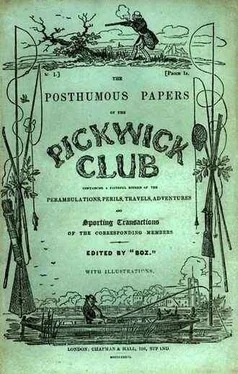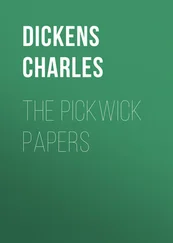‘An observer of human nature, Sir,’ said Mr. Pickwick.
‘Ah, so am I. Most people are when they’ve little to do and less to get. Poet, Sir?’
‘My friend Mr. Snodgrass has a strong poetic turn,’ said Mr. Pickwick.
‘So have I,’ said the stranger. ‘Epic poem — ten thousand lines — revolution of July — composed it on the spot — Mars by day, Apollo by night — bang the field–piece, twang the lyre.’
‘You were present at that glorious scene, sir?’ said Mr. Snodgrass.
‘Present! think I was; [3] [3] A remarkable instance of the prophetic force of Mr. Jingle’s imagination; this dialogue occurring in the year 1827, and the Revolution in 1830.
fired a musket — fired with an idea — rushed into wine shop — wrote it down — back again — whiz, bang — another idea — wine shop again — pen and ink — back again — cut and slash — noble time, Sir. Sportsman, sir ?‘abruptly turning to Mr. Winkle.
‘A little, Sir,’ replied that gentleman.
‘Fine pursuit, sir — fine pursuit. — Dogs, Sir?’
‘Not just now,’ said Mr. Winkle.
‘Ah! you should keep dogs — fine animals — sagacious creatures — dog of my own once — pointer — surprising instinct — out shooting one day — entering inclosure — whistled — dog stopped — whistled again — Ponto — no go; stock still — called him — Ponto, Ponto — wouldn’t move — dog transfixed — staring at a board — looked up, saw an inscription — “Gamekeeper has orders to shoot all dogs found in this inclosure” — wouldn’t pass it — wonderful dog — valuable dog that — very.’
‘Singular circumstance that,’ said Mr. Pickwick. ‘Will you allow me to make a note of it?’ [4] [4] Although we find this circumstance recorded as a “singular” one, in Mr. Pickwick’s note-book, we cannot refrain from humbly expressing our dissent from that learned authority. The stranger’s anecdote is not one quarter so wonderful as some of Mr. Jesse’s “Gleanings." Ponto sinks into utter insignificance before the dogs whose actions he records.
‘Certainly, Sir, certainly — hundred more anecdotes of the same animal. — Fine girl, Sir’ (to Mr. Tracy Tupman, who had been bestowing sundry anti–Pickwickian glances on a young lady by the roadside).
‘Very!’ said Mr. Tupman.
‘English girls not so fine as Spanish — noble creatures — jet hair — black eyes — lovely forms — sweet creatures — beautiful.’
‘You have been in Spain, sir?’ said Mr. Tracy Tupman.
‘Lived there — ages.’
‘Many conquests, sir?’ inquired Mr. Tupman.
‘Conquests! Thousands. Don Bolaro Fizzgig — grandee — only daughter — Donna Christina — splendid creature — loved me to distraction — jealous father — high–souled daughter — handsome Englishman — Donna Christina in despair — prussic acid — stomach pump in my portmanteau — operation performed — old Bolaro in ecstasies — consent to our union — join hands and floods of tears — romantic story — very.’
‘Is the lady in England now, sir?’ inquired Mr. Tupman, on whom the description of her charms had produced a powerful impression.
‘Dead, sir — dead,’ said the stranger, applying to his right eye the brief remnant of a very old cambric handkerchief. ‘Never recovered the stomach pump — undermined constitution — fell a victim.’
‘And her father?’ inquired the poetic Snodgrass.
‘Remorse and misery,’ replied the stranger. ‘Sudden disappearance — talk of the whole city — search made everywhere without success — public fountain in the great square suddenly ceased playing — weeks elapsed — still a stoppage — workmen employed to clean it — water drawn off — father–in–law discovered sticking head first in the main pipe, with a full confession in his right boot — took him out, and the fountain played away again, as well as ever.’
‘Will you allow me to note that little romance down, Sir?’ said Mr. Snodgrass, deeply affected.
‘Certainly, Sir, certainly — fifty more if you like to hear ’em — strange life mine — rather curious history — not extraordinary, but singular.’
In this strain, with an occasional glass of ale, by way of parenthesis, when the coach changed horses, did the stranger proceed, until they reached Rochester bridge, by which time the note–books, both of Mr. Pickwick and Mr. Snodgrass, were completely filled with selections from his adventures.
‘Magnificent ruin!’ said Mr. Augustus Snodgrass, with all the poetic fervour that distinguished him, when they came in sight of the fine old castle.
‘What a sight for an antiquarian!’ were the very words which fell from Mr. Pickwick’s mouth, as he applied his telescope to his eye.
‘Ah! fine place,’ said the stranger, ‘glorious pile — frowning walls — tottering arches — dark nooks — crumbling staircases — old cathedral too — earthy smell — pilgrims’ feet wore away the old steps — little Saxon doors — confessionals like money–takers’ boxes at theatres — queer customers those monks — popes, and lord treasurers, and all sorts of old fellows, with great red faces, and broken noses, turning up every day — buff jerkins too — match–locks — sarcophagus — fine place — old legends too — strange stories: capital;’ and the stranger continued to soliloquise until they reached the Bull Inn, in the High Street, where the coach stopped.
‘Do you remain here, Sir?’ inquired Mr. Nathaniel Winkle.
‘Here — not I — but you’d better — good house — nice beds — Wright’s next house, dear — very dear — half–a–crown in the bill if you look at the waiter — charge you more if you dine at a friend’s than they would if you dined in the coffee–room — rum fellows — very.’
Mr. Winkle turned to Mr. Pickwick, and murmured a few words; a whisper passed from Mr. Pickwick to Mr. Snodgrass, from Mr. Snodgrass to Mr. Tupman, and nods of assent were exchanged. Mr. Pickwick addressed the stranger.
‘You rendered us a very important service this morning, sir,’ said he, ‘will you allow us to offer a slight mark of our gratitude by begging the favour of your company at dinner?’
‘Great pleasure — not presume to dictate, but broiled fowl and mushrooms — capital thing! What time?’
‘Let me see,’ replied Mr. Pickwick, referring to his watch, ‘it is now nearly three. Shall we say five?’
‘Suit me excellently,’ said the stranger, ‘five precisely — till then — care of yourselves;’ and lifting the pinched–up hat a few inches from his head, and carelessly replacing it very much on one side, the stranger, with half the brown paper parcel sticking out of his pocket, walked briskly up the yard, and turned into the High Street.
‘Evidently a traveller in many countries, and a close observer of men and things,’ said Mr. Pickwick.
‘I should like to see his poem,’ said Mr. Snodgrass.
‘I should like to have seen that dog,’ said Mr. Winkle.
Mr. Tupman said nothing; but he thought of Donna Christina, the stomach pump, and the fountain; and his eyes filled with tears.
A private sitting–room having been engaged, bedrooms inspected, and dinner ordered, the party walked out to view the city and adjoining neighbourhood.
We do not find, from a careful perusal of Mr. Pickwick’s notes of the four towns, Stroud, Rochester, Chatham, and Brompton, that his impressions of their appearance differ in any material point from those of other travellers who have gone over the same ground. His general description is easily abridged.
‘The principal productions of these towns,’ says Mr. Pickwick, ‘appear to be soldiers, sailors, Jews, chalk, shrimps, officers, and dockyard men. The commodities chiefly exposed for sale in the public streets are marine stores, hard–bake, apples, flat–fish, and oysters. The streets present a lively and animated appearance, occasioned chiefly by the conviviality of the military. It is truly delightful to a philanthropic mind to see these gallant men staggering along under the influence of an overflow both of animal and ardent spirits; more especially when we remember that the following them about, and jesting with them, affords a cheap and innocent amusement for the boy population. Nothing,’ adds Mr. Pickwick, ‘can exceed their good–humour. It was but the day before my arrival that one of them had been most grossly insulted in the house of a publican. The barmaid had positively refused to draw him any more liquor; in return for which he had (merely in playfulness) drawn his bayonet, and wounded the girl in the shoulder. And yet this fine fellow was the very first to go down to the house next morning and express his readiness to overlook the matter, and forget what had occurred!
Читать дальше










